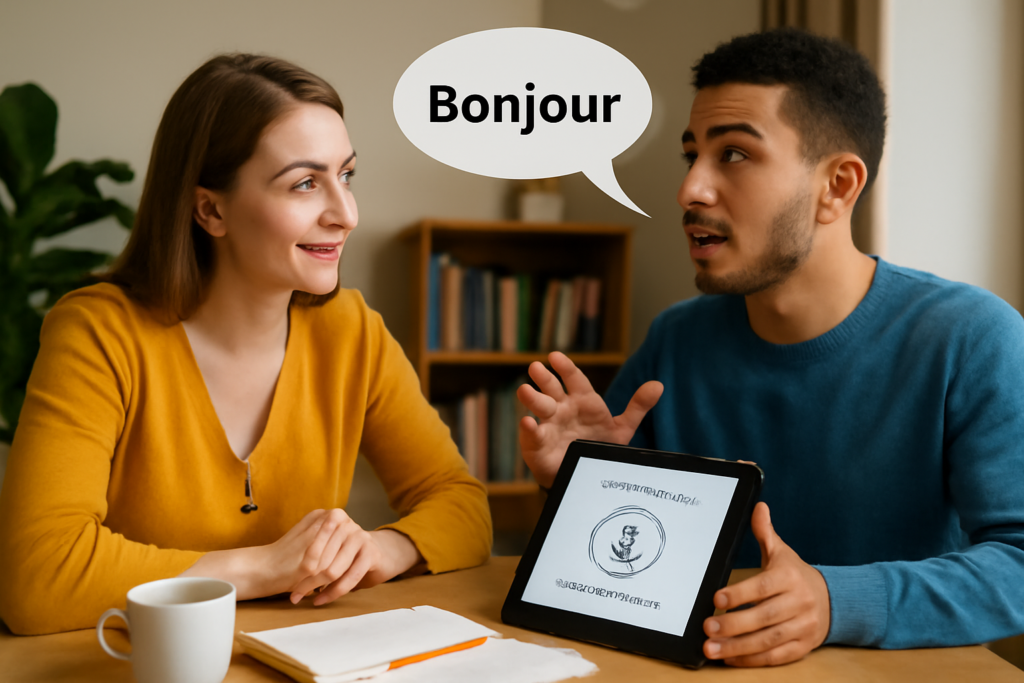
Let’s be honest—learning a new language isn’t easy. It takes time, patience, and a bit of courage. But it doesn’t need to be overwhelming or expensive, and it definitely doesn’t require fancy tech or gimmicks. I’ve been teaching languages for nearly two decades, and in that time, I’ve seen what works and what doesn’t.
This guide is for anyone serious about starting a new language in 2025—whether it’s for school, travel, work, or just because you’ve always wanted to. I’ll walk you through what really helps people learn effectively, based on real experience, not marketing hype.
What Learning a Language Really Takes
Here’s what most learners don’t realise at the start: it’s not about talent or having the best memory. The people who succeed are the ones who:
- Stick with it regularly, even just 15 minutes a day
- Don’t worry about making mistakes
- Actually use the language out loud
If you can do those things, you’re already ahead of most beginners.
Method 1: Work With a Real Tutor
There’s a reason I’m starting here. Having someone guide you, answer your questions, and help you speak from day one makes a huge difference.
One-to-one tutoring is beneficial if:
- You’re new to the language
- You’re preparing for exams like GCSE, A-Level, ESOL or TOEFL
- You’ve tried apps or books but got stuck or lost motivation
Even just one session a week can keep you on track. Online tutoring makes it easy to fit into your routine.
Method 2: Try a Small Group Class
Not everyone can afford private lessons—and not everyone needs them. Group tutoring, when done right, can be just as effective. A good small class (2–3 people) gives you the benefit of speaking practice, peer encouragement, and a clear structure.
It’s also great if you get a bit nervous speaking one-on-one and want to build confidence.
Method 3: Use Tools That Support, Not Replace, Real Learning
There are loads of free and paid tools out there: Duolingo, YouTube channels, flashcards, podcasts, and grammar books. They’re helpful—but they should support your learning, not be the whole thing.
Try this routine:
- 20 minutes of a structured lesson (with a tutor or textbook)
- 10 minutes of listening or reading (podcast, song, article)
- 5 minutes reviewing new words with flashcards
That’s enough to make steady progress, especially if you do it 4–5 days a week.
What About Apps?
Language apps are useful for building habits, but they can only take you so far. They don’t give you proper speaking practice or teach you how to hold a real conversation. Use them, but don’t rely on them.
Daily Habits That Make a Big Difference
The small things you do every day matter more than one big study session at the weekend. Here are simple habits that help:
- Say five sentences aloud every morning in your new language
- Change your phone settings to the target language
- Watch a short YouTube video with subtitles
- Label objects in your house
- Repeat useful phrases out loud
None of these take long, but they add up over time.
For Students: GCSE, A-Level, and TOEFL Learners
If you’re learning a language for exams, your needs are a bit different. You’ll want to focus on:
- Grammar and writing structure
- Exam question formats
- Listening and speaking under time limits
Working with a tutor who knows the curriculum is the best way to prepare. Group lessons with other exam students also help build speaking confidence.
For Adults: Busy Schedules, Practical Goals
If you’re learning a language as an adult—for travel, work, or personal interest—you probably want something flexible and practical.
Focus on:
- Phrases you’d actually use
- Listening and speaking practice over grammar drills
- Weekly sessions to stay consistent
Even 15–20 minutes a day can get you results. The key is sticking with it.
What to Avoid
Over the years, I’ve seen learners waste a lot of time. Here’s what I recommend avoiding:
- Jumping between apps or methods every week
- Waiting until you’re “ready” to start speaking
- Cramming for hours and then burning out
- Studying only grammar with no speaking practice
Keep it steady, simple, and practical.
How Our Students Learn Faster
At Euro Language Tuition, our students often tell us the same thing: they learn better because they feel supported. Whether it’s in a one-to-one session or a small group class, they get clear guidance, time to practice speaking, and feedback they can use.
You don’t need to be perfect. You just need to show up and keep going.
FAQs: Common Questions About Learning a New Language
Q: Can I really learn a new language as an adult?
Yes. Adults may take a bit longer at first, but they’re often more motivated and focused.
Q: How long does it take to become fluent?
It depends on your consistency and how much you practice speaking. For many learners, 6–12 months of steady effort gets them conversational.
Q: What’s better: an app or a tutor?
Apps are good for vocab. Tutors help you speak, build structure, and stay motivated.
Q: Should I learn grammar first?
You can learn basic grammar as you go, but focus on phrases and speaking early on.
Q: What language should I start with?
Start with the one you’re most interested in—it’s easier to stay motivated.
Final Thoughts
The best way to learn a new language in 2025 isn’t complicated. It’s not about having the perfect method. It’s about doing something small, regularly, with the right guidance and a bit of patience.
And if you’re looking for real support from tutors who care—whether online, in a group, or face-to-face—we’re here to help.
Ready to get started? Check out our one-to-one or group tutoring options today.